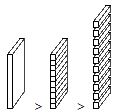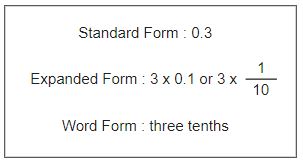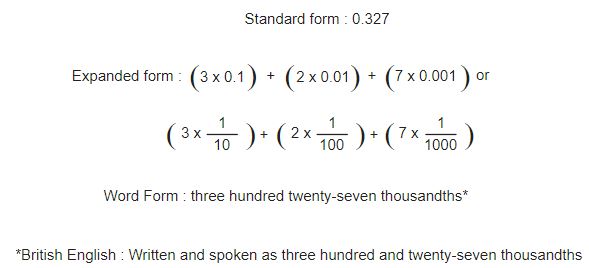Use the illustrations below to help explain how one whole unit is equal to 10 tenths, to 100 hundredths, and 1,000 thousandths. This understanding will really help when working with decimals and with place values to the right of the decimal point.
| Here is one (1) whole unit |  |
| 1 can be split into 10 equal parts |  |
| Each part is one tenth of the whole |  |
| Each tenth can be split into ten equal parts |  |
| There are 100 parts in the whole so each part is called one hundredth |  |
| Each hundredth can be split into ten equal parts |  |
| There are 1000 parts in the whole so each part is called one thousandth |  |
Decimals, or decimal fractions to give them their full and more proper name, can be written in different forms. Writing and saying decimals in these different forms promotes the important understanding of the underlying place value concepts. These forms are shown below starting with tenths.
Tenths
Assuming the square represents one whole unit, the shaded area represents three tenths.
This can be written in different forms as shown below.

Hundredths
Assuming the square represents one whole unit, the shaded area represents fifteen hundredths.
This can be written in different forms as shown below.

Thousandths
Assuming the square represents one whole unit, the shaded area represents three hundred twenty-seven thousandths.
This can be written in different forms as shown below.

Matching Games
Try the two matching games below to practice with decimals in written, standard, and expanded form.
- Decimals in Expanded Form
- Decimals in Written Form
- Be careful when discussing tenths, hundredths, and thousandths with your children. Pronounce these terms with special emphasis on the “-ths” to help avoid confusion with tens, hundreds, and thousands.
- It is common to include the word “point” when referring to decimals in every-day use. For example, the world record is “nine point five eight seconds”. As your children are developing their understanding of decimal place value, encourage them to use tenths, hundredths, or thousandths e.g. nine and fifty-eight hundredths.









